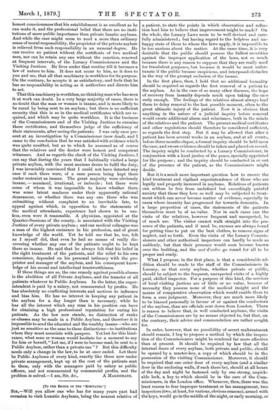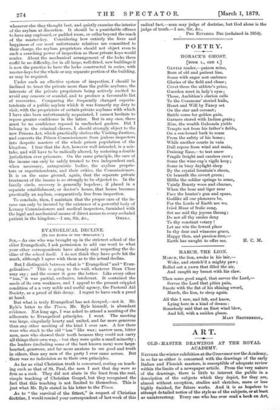(TO TSB EDITOR OF THE "sractiron.1
you allow one who has for many years past had occasion to visit Lunatic Asylums, being the nearest relative of a patient, to state the points in which observation and reflec- tion lead him to believe that improvement might be made? On
the whole, the Lunacy Laws seem to be well devised and care-, fully administered ; but having regard to the helpless and un-
happy state of those to whom the laws apply, it is impossible to be too anxious about the matter. At the same time, it is very desirable that the public should possess the fullest securities against the improper application of the laws, not so much because there is any reason to suppose that they are really used for fraudulent purposes, but because it would be most unfor- tunate if the public became suspicious, and interposed obstacles in the way of the prompt seclusion of the insane.
In the first place, then, I hold that no additional formality should be required as regards the first removal of a patient to the asylum. As in the case of so many other diseases, the hope of recovery from insanity depends much upon taking the case early enough. The feelings of the relatives almost always lead them to delay removal to the last possible moment, often to the great ultimate injury of the patient. Now it is obvious that anything in the nature of a judicial inquiry before removal would create additional alarm and reluctance, both in the minds of the relatives and the patient. The present medical certificates and other regulations should therefore be considered sufficient, as regards the first step. But it may be allowed that after a patient has been several weeks in an asylum, and at all events, before three months elapse, a formal inquiry should be held upon the case, and sworn evidence should be taken and placed on record.
The inquiry might be conducted by a Lunacy Commissioner, in conjunction with a local justice of the peace, specially appointed for the purpose ; and the inquiry should be conducted in or out of the presence of the patient, as the Commissioners might decide.
But it is a much more important question how to ensure the kind treatment and vigilant superintendence of those who are legally and properly immured in asylums. Relatives of patients can seldom be free from undefined but exceedingly painful anxiety that those they love so well may be subjected to treat- ment which can never become matter of evidence, especially in cases where insanity has progressed far towards dementia. In a large proportion of cases, the statements of the patients themselves must be of no value. Nor in such cases can the visits of the relatives, however frequent and unexpected, be of much use. The visitor cannot walk straight into the pre- sence of the patients, and if need be, excuses are always found for getting time to put on the best clothes, to remove signs of neglect, and so forth. Even the visits of the Lunacy Commis- sioners and other authorised inspectors can hardly be made so suddenly, but that their presence would soon become known over the building, and the mot d'ordre go round for all to be proper and ready.
What I propose, in the first place, is that a considerable ad- dition should be made to the staff of the Commissioners in Lunacy, so that every asylum, whether private or public, should be subject to the frequent, unexpected visits of a highly paid, skilled inspector. For a purpose of this kind, the services of local visiting justices are of little or no value, because of necessity they possess none of the medical insight and the means of comparative observation which would enable them to form a sure judgment. Moreover, they are much more likely to be biassed personally in favour of or against the conductors of the asylum, than are officials sent down from London. There is reason to believe that, in well conducted asylums, the visits of the Commissioners are by no means objected to, but that, on the contrary, their advice and commendation are rather sought for.
In order, however, that no possibility of secret maltreatment should remain, I beg to propose a method by which the inspec- tion of the Commissioners might be rendered far more effective than at present. It should be required by law that all the internal doors of every asylum, both private and public, should be opened by a master-key, a copy of which should be in the possession of the visiting Commissioner. Moreover, it should be required that one outer door of every asylum (and a similar - door in the enclosing walls, if such there be), should at all hours of the day and night be fastened only by one strong, unpick- able lock, a key to which should be in the care of the Com- missioners, in the London office. Whenever, then, there was the least reason to fear improper treatment or lax management, two inspectors (two, at least, for various, obvious reasons), armed with the keys, would go in the middle of the night, or early morning, or whenever else they thought best, and quietly examine the interior of the asylum at discretion. It should be a punishable offence to have any cupboard, or padded room, or cellar beyond the reach of the master-key. Considering how entirely the lives and happiness of our most unfortunate relatives are committed to their charge, the asylum proprietors should not object even to such a searching power of inspection as these private keys would confer. About the mechanical arrangement of the locks there
codld be no difficulty, for in all large, well-fitted, new buildings it is now the practice to have the locks constructed in series, with master-keys for the whole or any separate portion of the building, as may be required.
Under such an effective system of inspection, I should be inclined to trust the private more than the public asylums, the interests of the private proprietors being actively excited to avoid any censure or scandal, and to produce a favourable list of recoveries. Comparing the frequently changed superin- tendents of a public asylum which it was formerly my duty to visit, with the proprietors of certain private asylums with which I have also been unfortunately acquainted, I cannot hesitate to repose greater confidence in the latter. But in any case, there must be no confidence reposed in unchecked gaolers. Did I belong to the criminal classes, I should strongly object to the new Prisons Act, which practically shelves the Visiting Justices, and converts the Prison Commissioners from jealous inspectors into despotic masters of the whole prison population of the kingdom. I fear that the Act, however well intended, is a mis- take, and will have to be radically altered, by restoring a double jurisdiction over prisoners. On the same principle, the care of the insane can only be safely trusted to two independent and, when necessary, antagonistic bodies, the asylum proprie- tors or superintendents, and their critics, the Commissioners. It is on the same ground, again, that the separate private treatment of the insane is so strongly to be objected to. In the family circle, recovery is generally hopeless; if placed in a separate establishment, or doctor's house, that house becomes practically an asylum, comparatively free from inspection.
To conclude, then, I maintain that the proper care of the in- sane can only be insured by the existence of a powerful body of Lunacy Commissioners and medical inspectors, furnished with the legal and mechanical means of direct access to every secluded
patient in the kingdom.—I am, Sir, &c., OMEGA.



































 Previous page
Previous page